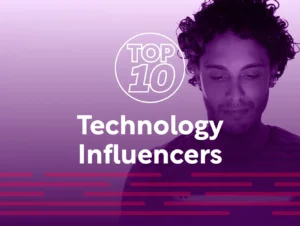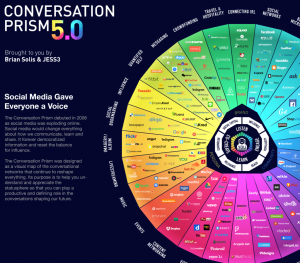
Source: Shutterstock
Guest post by Dan Zarella, author of “The Social Media Marketing Book,” published by O’Reilly.
When you’re trying to find targets for a social media marketing campaign, you should be looking for two types of people, influencers and audience. Your audience is the people you’re trying to sell to, this is a wide swath of potential users, clients or customers. They may or may not be heavily involved in social media and they may or may not have large followings. Your influencers are the people your audience listens to. They are actively engaged in the social web and can communicate with lots of people. They are the vector for your contagious messages to spread through, to reach your audience you should seed your campaigns to your influencers.
There are two ways of targeting influencers, you can either find the social media sites they frequent the most and attempt to reach them en masse, or you can identify especially influential individuals and engage them one by one. Both methods work well in concert.
Fishing Where the Influential Fish Are
The key to the first, en mass method is “fishing where the fish are.” That is understanding which behaviors typically indicate that someone is a savvy and frequent user of social media and placing your content in the path of those behaviors. I’ve done some research on these behaviors:
The research I did on viral content sharing shows that frequent users of social web technologies like Twitter, blogs, and social news and networking sites tend to share online content with more people, more often than those that do not.
An interesting detail of this data is that while frequent users of Facebook and web forums share content with more people and more often in some aspects, generally they’re not as virulent as the users of less-mainstream technologies (with the exception of blog readers).
This means that if you can locate topic-specific social media sites (for example Sphinn, which is Digg for marketers) and get your content to go popular there you’ll be in front of large groups of relevant influentials. Tools like Alltop or Quantcast’s related sites features can be used to discover relevant sites for reaching influencers.
Finding Individual Influencers
The flipside of the influencer marketing coin is to identify individuals who stand out from the “influential fish” crowd as especially important and approaching them one-on-one to build relationships.
Perhaps the easiest first step in this direction is to find the most influential Twitter users about your niche. Tools like Twitter Grader and Klout both offer very similar user search features which allow you to enter a keyword and find the most powerful users who are related to that topic. Of course my favorite metric for this is “ReTweetability.”
There are also tools for identifying niche influencers on oher social media platforms like Facebook Grader, Technorati, and BoardReader. A number of tools also exist to search across many different platforms at once, like Who’s Talkin’, and Social Mention but these tend to be less effective at identifying who the most influential users are.





check out socialmedialibrary.co.uk…has a slightly complex metric
Thanks so much; exactly the kind of insight I and others need.
Dan, one thing to watch out for is that high influence scores like Klout don't necessarily translate into authority within a given niche. Once you have identified the participants, scores can help with some relative ranking, but even then I find that they are usually biased towards chattiness, not necessarily what a person would define as influence. I talk about some of this in my blog post, Influence is not Authority. Keywords are not conversations.
That's why I am using Wadja.com With them I am able to follow conversations (Youtube + Twitter) instead of just users.
Laura Chapman
Create & Follow #Labels wadja.com
I can see how both strategies mentioned can be worthwhile, but I'd like to see an extension to this post, perhaps in the future that talks about how to do this effectively. Too often I see influencers approached with a sales pitch in mind and little regard to the relationship. Once again people are looking for an immediate turn key solution, but it would strike me as important for a relationship to be built with these influencers.
If you need to find them or look up their “stats” in a program, then they are not “influencers.”
EPICFAILOFTHENIGHT!
Dan & Brian-
Influence is a big topic right now, and rightfully so. I think we need to think about influence in a more nuanced, multidimensional way, and I've been looking for a tool to find influencers of a certain type I discuss here http://daretocomment.com/what-klout-cant-calcul… – It's looking like I'll have to create my own, user-content-generated site. Anyone that would like to discuss collaboration can reach me at daretocomment@gmail.com
You should read “the tipping point” by Malcolm Gladwell, since only “target audience” and “influencers” just doesn't cut it in social media and community building, there are a few more variables to fill
You should read “the tipping point” by Malcolm Gladwell, since only “target audience” and “influencers” just doesn't cut it in social media and community building, there are a few more variables to fill
That's why I am using Wadja.com With them I am able to follow conversations (Youtube + Twitter) instead of just users.
Laura Chapman
Create & Follow #Labels wadja.com
Great article!
The trouble with these online tools is that you can only monitor a single user or a few term, hashtag, etc. But they usually do not let you do much drill down and discovery. If you know who to monitor, then they are great. If you want to know who were the influencers for a brand or a topic, they will give you a list. But you can’t get deeper insights like why is a particular user the influencer, is it because he have a lot of follower or is it because he gets a lot of retweets, or he simply tweets a lot, etc. So if you want to discover deep insights, they are probably not sufficient.
Getting the raw data and doing a little influence analytics not only gives you the influencers, but also tells you why they are influential. Influencers are not all the same, some works better under one marketing constraint than another. I've describe this a blog series here:
http://lithosphere.lithium.com/t5/Building-Comm…
Well , the view of the passage is totally correct ,your details is really reasonable and you guy give us valuable informative post, I totally agree the standpoint of upstairs. I often surfing on this forum when I m free and I find there are so much good information we can learn in this forum!
multi-cavity
I really like this type of Shoes too, can you help me look at which
ugg boots
http://www.boots-outlet.us
ugg gissella boots
http://www.uggs-outlet-store.com/ugg-gissella-b…
ugg elsey boots
http://www.uggs-outlet-store.com/ugg-elsey-boot…
nike dunk
http://www.discount-nike-dunk-shoes.com
ugg classic tall stripe cable knit boots
http://www.uggs-outlet-store.com/ugg-classic-ta…
ugg boots outlet
http://www.uggs-outlet-store.com
winter boots
http://www.bootsforcheap.us
coach boots
http://www.discount-coach-outlet.com/coach-boot…
coach leather
http://www.discount-coach-outlet.com/coach-leat…
Nike Dunk mid
http://www.discount-nike-dunk-shoes.com/Nike-Du…
ugg boots
http://www.bootsforcheap.us